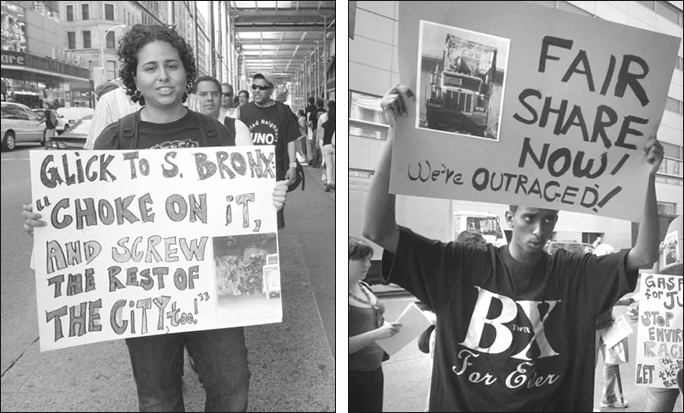By Albert Amateau
Members of the Organization of Waterfront Neighborhoods from the South Bronx, Williamsburg, Greenpoint, Staten Island, West Harlem and other waterfront neighborhoods, demonstrated on Tues., June 12, in front of Assemblymember Deborah Glick’s E. 14th St. office. The demonstrators protested Glick’s vow to block the city’s proposed marine transfer station for recyclables on the Gansevoort Peninsula, which requires a State Legislature amendment to the Hudson River Park Act.
The peninsula, on the Hudson River between Gansevoort and Little W. 12th Sts., is designated to become an 8-acre section of the 5-mile-long riverfront park between Chambers and 59th Sts. With only two weeks left in the Albany legislative session, the Bloomberg administration is calling on the Assembly and State Senate to amend the act to allow the proposed transfer station, which would move recyclables by barge to a plant in Sunset Park, Brooklyn. The station is a key part of the city’s long-term Solid Waste Management Program, known as SWAMP, intended to make sure that each borough is able to handle its own garbage.
OWN is a coalition of groups in neighborhoods, many of them predominantly black and Hispanic, that have borne the burden of Department of Sanitation facilities. OWN says that Glick’s opposition to the transfer station is a NIMBY (not in my backyard) reaction and puts the entire 20-year SWAMP in jeopardy.
“The SWAMP is designed to ensure that no New York City community is too privileged to handle its own share of the city’s waste,” says a statement issued by the group.
Glick, however, issued a statement in response to the June 12 demonstration saying the mayor has misrepresented the issue of the Gansevoort transfer station and has pitted neighborhood against neighborhood.
“There are viable alternatives for the marine transfer station in close proximity to Gansevoort which do not require major legislative action,” she said. Glick, Assemblymember Richard Gottfried and State Senator Tom Duane have proposed the transfer station be built on Pier 76, where the city’s auto tow pound is located, across from the Javits Convention Center. They also propose a rail transfer for solid waste to be built at W. 34th St. and 11th Ave.
“These alternatives have not been studied by the city, but Friends of Hudson River Park [a civic group that advocates for the park] have had studies done of a number of alternative sites in the West 30s which demonstrated their viability,” the Glick statement says. “Every borough must do its part but the city must also work with every community to ensure the best possible decision. It is unacceptable for the mayor to tout his environmental vision for the future while his administration is seeking to dramatically reduce critical parkland in one of the most park-starved communities in the city,” the statement says.
On the margins of the protest, about 20 counterdemonstrators stood quietly handing out fliers. Among them was District Leader Keen Berger.
“The city has not looked at all the possibilities, other places to put the waste transfer station,” Berger said, “and that bothers me tremendously. They see a park and think they can take it.”





































